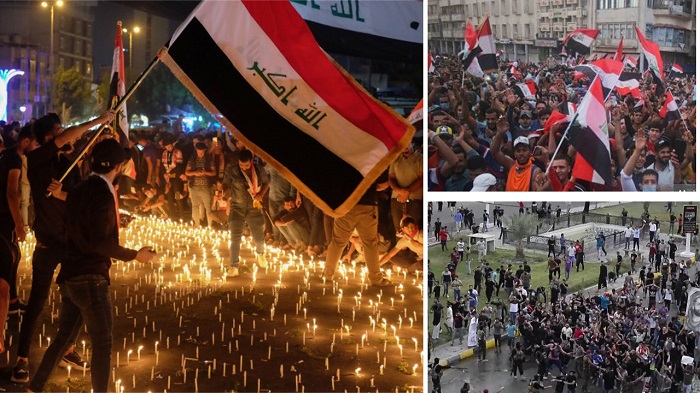
(PMOI / MEK Iran): The Iraqi Shiite militias attack protesters. The demonstrations were terrorized by the Iranian regime backed terrorists that raised a lot of condemnations, in Iraq and abroad.
Protests erupted in Iraq this week against Iranian interference in Iraqi affairs. The protests mirror last year’s October Revolution in Iraq, which brought thousands of Iraqis in Southern Shi’ite-majority provinces into the streets to call for the dismantling of Iranian regime proxies.
Karbala, southern #Iraq
"Iran, out, out! Karbala will be free!"#Iranpic.twitter.com/KxpGutn7JE— People's Mojahedin Organization of Iran (PMOI/MEK) (@Mojahedineng) November 8, 2019
Protesters last year chanted anti-Iranian regime slogans and camped out in tents in protest of Iranian interference. The massive demonstrations garnered international attention and continued even after the Iranian regime dispatched terrorist proxy groups to assassinate Iraqi activists.
This week’s protests are a confirmation that the Iraqi people are unwilling to allow the Iranian regime to continue its interference in their affairs, and they will protest until their government stops allowing Tehran to dictate Iraqi politics.
January 27 – Nasiriyah, southern #Iraq
Demonstrations continue against government corruption & the Iranian regime's meddling.pic.twitter.com/cvBYii8Bfc— People's Mojahedin Organization of Iran (PMOI/MEK) (@Mojahedineng) January 27, 2020
The Iranian regime has expressed concern about its future influence in Iraq since last October and anticipated more protests. On October 25, Kayhan daily, the conservative paper known as the mouthpiece of Supreme Leader Ali Khamenei, wrote about the fallout from last year’s protests and the potential consequences of losing control over Iraq. The paper wrote: “Last year, the first protests were against corruption, unemployment, and the government’s failure to provide public services. The protests overthrew several governments and overshadowed the entire Iraqi political situation.”
Strategic Depth
Iran currently faces widespread social unrest at home and increasing international isolation. The Iranian Resistance, the National Council of Resistance of Iran’s (NCRI), and the People’s Mojahedin Organization of Iran (PMOI / MEK Iran) have organized a viable democratic alternative to the regime that threatens the very existence of the clerical dictatorship. The mullahs are clinging to power by a thread.
The regime hopes to survive by suppressing dissent at home and by creating “strategic depth” in the Middle East. Maintaining control in Iraq is crucial to the creation of a Shi’ite crescent in the Middle East. The mullahs believe that by using terrorist proxies and exploiting influence in key areas, they can seize enough power to spread Islamic fundamentalism throughout the region and prevent their overthrow at home.
Tehran has successfully interfered in Iraqi affairs due to corruption in both governments. High-ranking officials in the Iraqi government have been paid off to secure their cooperation, despite the protests of the Iraqi people. Syria and Lebanon have also been used as strategic targets of the Iranian regime’s campaign to expand its influence. Regime-backed proxies have funded, trained, and supported terrorist attacks and wars in both countries, further destabilizing the region.
Iraq seems a lost ground for mullahs since IRGC’s Quds Force commander #QassemSoleimani was killed on January 3 in a US army drone attack close to Baghdad airporthttps://t.co/YZwiUNUtZ3#Iran #Iraq #IRGCTerrorists @USAdarFarsi pic.twitter.com/74hZ0htiat
— MEK Iran (Mujahedin-e Khalq) (@MEK_Iran) January 26, 2020
The United States took action last year by adding the Islamic Revolutionary Guards Corps (IRGC), the Quds Force, and their affiliates to its list of Foreign Terrorist Organizations (FTO). This substantially reduced the regime’s ability to fund its terrorist activities and warmongering in the Middle East.
Iraq is now even more imperative to the Iranian regime’s grip on power. Without its influence in Baghdad, the mullahs would be left with few allies in the face of an impending popular uprising.
In November 2019, the Iranian people told their government exactly what they thought of it when they chanted, “Death to the dictator!” and burned regime buildings. They joined the MEK Resistance Units in calls for a free and democratic Iran and were met with a brutal attack from the IRGC that left 1,500 protesters dead and 12,000 in prison. The Iranian people have not forgotten 2019, nor have the Iraqis.
Special Representative for Iran Brian Hook: “The @Reuters report on the massacre ordered by @khamenei_ir underscores the urgency for the international community to punish the perpetrators and isolate the regime for the murder of 1,500 Iranian citizens.” https://t.co/TpUncLjDcv
— Department of State (@StateDept) December 23, 2019
On 15 November 2015, a report by The National Council of Resistance of Iran (NCRI) revealed that the Iranian regime’s ambassador to Iraq, Iraj Masjedi, acts as a secret governor of Iraq. The report stated that Masjedi was a key figure in forming Iraq’s Popular Mobilization Force (PMF).
The 1 October 2020 marked the seventh anniversary of the 1 September 2013 massacre in Camp Ashraf, Iraq. Iraqi forces killed 52 unarmed members of the MEK, under the order of the Iranian regime’s Supreme Leader, Ali Khamenei. Many MEK members in Iraq have been targeted over the years by the influence of the Iranian regime. The mullahs orchestrated for their terrorist agents or the Iraqi army, formerly under the command of Nuri-al Maliki, to carry out these attacks.
and People’s Mojahedin Organization of Iran – MEK IRAN – YouTube
